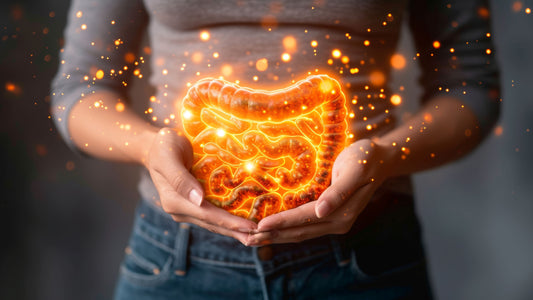
If you've ever found yourself standing in front of the refrigerator at 9 PM, desperately craving chocolate or chips despite eating a full dinner, you're not alone. What feels like a lack of willpower is actually your hormones speaking louder than your logical mind. For women over 40, these cravings intensify as hormonal shifts create a perfect storm of metabolic changes, emotional eating triggers, and physiological demands that can feel impossible to control.
The relationship between hormones and appetite is far more complex than most realize. Your body operates an intricate network of chemical messengers that regulate everything from hunger and satiety to mood and energy levels. When these hormones fall out of balance—particularly during perimenopause and menopause—the resulting food cravings can feel overwhelming and uncontrollable.
In This Article, You Will Learn:
• Why estrogen, progesterone, and cortisol fluctuations trigger specific food cravings
• The science behind hormonal weight gain and metabolic slowdown
• Evidence-based strategies to naturally balance hunger hormones
• How targeted nutrition and supplementation can restore hormonal harmony
• Practical meal timing and food combination strategies
• When to seek professional support for persistent cravings
The Hormone-Appetite Connection: What's Really Happening in Your Body

ESTROGEN: THE MASTER APPETITE REGULATOR
Estrogen plays a crucial role in appetite regulation by influencing leptin sensitivity—the hormone responsible for signaling fullness to your brain. As estrogen levels decline during perimenopause, leptin becomes less effective at communicating satiety, leaving you feeling hungry even after adequate meals.
Research published in the Journal of Clinical Endocrinology & Metabolism demonstrates that estrogen deficiency correlates directly with increased appetite, particularly for high-carbohydrate and high-fat foods¹. This isn't a character flaw; it's your body attempting to restore hormonal balance through nutrition.
Lower estrogen levels also affect serotonin production, the neurotransmitter responsible for mood regulation and impulse control. When serotonin drops, your brain seeks quick fixes through sugar and refined carbohydrates, creating a cycle of craving and temporary satisfaction followed by energy crashes and more cravings

PROGESTRONE: THE CALMING INFLUENCE
Progesterone naturally suppresses appetite and supports stable blood sugar levels. During the luteal phase of your menstrual cycle, when progesterone peaks, many women report decreased cravings and improved portion control. However, as progesterone production declines with age, this natural appetite suppression diminishes.
The loss of progesterone's calming influence also affects sleep quality and stress management. Poor sleep disrupts ghrelin (hunger hormone) and leptin production, while chronic stress elevates cortisol—both contributing to increased appetite and cravings for comfort foods.

CORTISOL: THE STRESS-DRIVEN CRAVING CATALYST
Chronic stress elevates cortisol levels, which directly stimulate appetite and promote fat storage, particularly around the midsection. Cortisol triggers cravings for high-calorie, easily digestible foods as part of your body's evolutionary response to perceived threats.
Modern life provides constant low-level stressors—work deadlines, family responsibilities, financial concerns—that keep cortisol chronically elevated. This creates persistent hunger signals and makes it nearly impossible to feel satisfied with normal portions of healthy foods.
The Metabolic Shift: Why Your Old Strategies Stop Working
During hormonal transitions, your metabolism undergoes significant changes that affect how your body processes and stores food. Declining estrogen reduces muscle mass and slows metabolic rate, meaning you burn fewer calories at rest. Simultaneously, insulin sensitivity decreases, making it harder to process carbohydrates efficiently and easier to store them as fat.
These metabolic changes explain why the diet and exercise strategies that worked in your 30s become ineffective in your 40s and beyond. Your body literally requires different nutritional support to maintain stable energy, balanced appetite, and a healthy weight.
Supporting Hormonal Balance Through Targeted Nutrition
The Power of Maca for Hormone Regulation
Maca root has been used for centuries to support hormonal balance and energy levels. Rich in adaptogenic compounds, maca helps regulate the hypothalamic-pituitary-adrenal axis, which controls hormone production and stress response.
"Mighty Maca® Plus" combines organic maca with 30+ superfoods specifically chosen to support women's hormonal health. This comprehensive blend includes ingredients like ashwagandha for stress management, turmeric for inflammation reduction, and spirulina for sustained energy without blood sugar spikes.
The formula addresses multiple aspects of hormonal balance simultaneously—supporting adrenal function, promoting stable energy levels, and providing nutrients essential for hormone production. Many women report significant improvements in cravings, energy, and mood stability within 2-4 weeks of consistent use.
Comprehensive Menopause Support
For women experiencing more intense hormonal fluctuations, targeted supplementation can provide crucial support. "Mighty Maca® Menopause Capsules" offer a convenient way to support hormonal balance throughout the day.
This formulation specifically addresses the unique nutritional needs of women in perimenopause and menopause, providing concentrated support for hormone production, stress management, and metabolic function. The capsule format ensures consistent daily dosing and optimal absorption of key nutrients.
Restorative Sleep and Stress Management
Since poor sleep and elevated stress directly contribute to hormonal imbalances and food cravings, addressing these foundational aspects is crucial. "Nite-Zzz Caps" provide natural support for restorative sleep without the grogginess associated with pharmaceutical sleep aids.
Quality sleep is essential for hormone regulation, particularly growth hormone release and cortisol rhythm restoration. When you sleep better, your hunger hormones naturally rebalance, making it easier to maintain healthy eating patterns and stable energy levels throughout the day.
Evidence-Based Strategies for Craving Control
Meal Timing and Hormone Optimization
Research shows that eating patterns significantly influence hormone production and appetite regulation. Intermittent fasting, when done appropriately for women, can help restore insulin sensitivity and support natural hormone rhythms.
Consider a 14:10 eating window (14 hours fasting, 10 hours eating) rather than more aggressive fasting protocols that can stress women's hormonal systems. This gentle approach allows your body to restore natural hunger and satiety cues without triggering additional cortisol production.
Protein Priority and Blood Sugar Stability
Prioritizing protein at each meal helps stabilize blood sugar levels and provides amino acids necessary for neurotransmitter production. Aim for 25-30 grams of high-quality protein per meal to support satiety and reduce cravings between meals.
Combine protein with healthy fats and fiber-rich vegetables to slow digestion and maintain stable energy levels. This combination prevents the blood sugar spikes and crashes that trigger intense cravings for quick energy sources.
Strategic Carbohydrate Timing
Rather than eliminating carbohydrates entirely, focus on timing and quality. Consuming moderate amounts of complex carbohydrates earlier in the day supports serotonin production and provides sustained energy without evening blood sugar disruption.
Root vegetables, quinoa, and seasonal fruits provide nutrients that support hormone production while satisfying the body's need for glucose. Avoid refined sugars and processed foods that create rapid blood sugar fluctuations and subsequent cravings.
The Micronutrient Connection: Supporting Hormone Production
Many women experience intensified cravings due to underlying micronutrient deficiencies. Zinc, magnesium, B vitamins, and omega-3 fatty acids are all essential for proper hormone synthesis and regulation.
Zinc deficiency, in particular, can intensify sugar cravings and affect taste perception. Magnesium supports over 300 enzymatic reactions in the body, including those involved in blood sugar regulation and stress response. B vitamins are crucial for energy metabolism and neurotransmitter production.
Consider comprehensive nutritional testing to identify specific deficiencies that may be contributing to your cravings. Targeted supplementation can address these gaps more effectively than generic multivitamins.

When to Seek Additional Support
If intense cravings persist despite consistent implementation of these strategies, consider working with a healthcare provider who specializes in hormonal health. Underlying conditions such as insulin resistance, thyroid dysfunction, or severe hormonal imbalances may require additional medical intervention.
Bioidentical hormone replacement therapy, when appropriate, can provide significant relief for women experiencing severe menopausal symptoms and uncontrollable cravings. However, lifestyle and nutritional interventions should be optimized first to maximize the effectiveness of any medical treatments.
Long-Term Success: Building Sustainable Habits
Remember that hormonal balance is an ongoing process rather than a destination. Your nutritional and supplemental needs will continue to evolve as your body changes. Stay attuned to these shifts and be willing to adjust your approach accordingly.
Focus on progress rather than perfection. Small, consistent improvements in sleep, stress management, and nutrition compound over time to create significant changes in how you feel and function.
Reclaiming Control Over Your Appetite
Understanding the science behind hormonal food cravings empowers you to respond to your body's needs rather than fighting against them. By supporting your hormones through targeted nutrition, strategic supplementation, and lifestyle modifications, you can restore natural appetite regulation and break free from the cycle of intense cravings.
Your hormones are not your enemy—they're sophisticated communication systems designed to keep you healthy and balanced. When you learn to work with your hormonal rhythms rather than against them, you'll discover that maintaining a healthy relationship with food becomes significantly easier and more sustainable.
Take the first step toward hormonal balance today by implementing one or two of these evidence-based strategies. Your future self will thank you for the investment in your long-term health and vitality.

Q: How long does it take to see improvements in hormonal food cravings?
A: Most women notice initial improvements in energy and cravings within 2-4 weeks of implementing consistent sleep, stress management, and nutritional support. Full hormonal rebalancing typically takes 3-6 months of consistent effort.
Q: Can I still enjoy treats while balancing my hormones?
A: Absolutely! The goal is balance, not deprivation. Focus on consuming treats mindfully and in moderation while ensuring your daily nutrition supports stable blood sugar and hormone production. Quality matters more than complete restriction.
Q: Are hormonal food cravings different from emotional eating?
A: While they often overlap, hormonal cravings are driven by physiological needs for specific nutrients or blood sugar stabilization, while emotional eating is typically triggered by stress, boredom, or other emotional states. Both can be addressed through similar strategies focusing on overall hormonal balance.
Q: Should I avoid all carbohydrates if I'm experiencing intense cravings?
A: No. Eliminating carbohydrates entirely can actually worsen hormonal imbalances and intensify cravings. Focus on choosing complex carbohydrates, timing them appropriately, and combining them with protein and healthy fats for optimal blood sugar stability.
¹ Hirschberg, A. L. (2012). Sex hormones, appetite and eating behaviour in women. Journal of Clinical Endocrinology & Metabolism, 97(4), 1238-1246.






